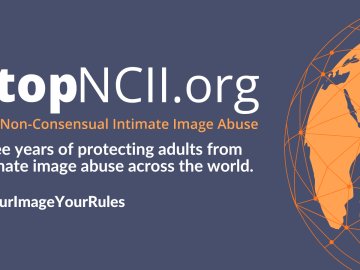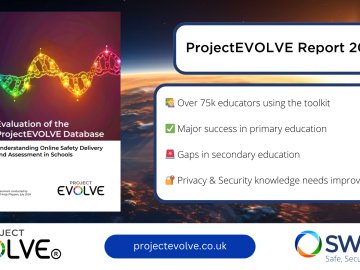Upskill as an Educator of the Digital Generation in Scotland
Digital is revolutionising childhood. From smartphones to smart speakers, technology is rapidly claiming a role in all aspects of life. Traditional online safety messaging needs to adapt too. How can educators support young people as empowered, engaged, critical and responsible digital citizens?
The #SafeAndEmpowered training programme was endorsed and funded by Education Scotland. In the programme we covered the range of online harms faced by young people within the context of tech trends and the digital skills agenda.
The programme has now completed but the resources are still available FREE to educators across Scotland. This includes videos, webinar recordings, podcasts, a resource pack, a parents presentation and more. To access the resources simply sign up to our newsletter below.
Topics We Cover
Don’t Share, Don’t Talk, Don’t Meet!
Let’s bring online safety education up to date
Sexting
How effective is blaming and shaming?
The Greatest Lie Ever Told
Trust, conspiracy, algorithms and critical thinking
Gaming Addiction
Are the kids really hooked?
Disengaged and Oversharing
Tips for involving families in online safety
Being Me Online
How can educators manage their social media presence?
"Hurry, book NOW before it’s too late!"
Clickbait and why it’s a problem for educators, and more!
Lots of really thought-provoking facts, statements and discussions that made me reflect on our school’s approach
Podcast interview series
Each of these podcast are also available on Spotify and Soundcloud.
The Big Data Show
Jess had a chat with Clare Duffy, Director of Civic Digits, about the Big Data Show, and FREE in-school workshops. Listen below
Young people speak about their online rights
Jess talked to Beccie and Marcus about children's rights online. These two young people are involved in ENYA, the European Network of Young Advisors. What do young people want and need in the digital environment? They tell us all!
Thank you to the Children & Young People's Commissioner Scotland for hosting this conversation. Listen below.
Preventing child sexual abuse
Jess is joined by Stuart Allardyce and Lindsay Mullen from Stop It Now! Scotland. The discussion includes talking about preventative approaches to child sexual abuse including the Upstream project, educating young people, and working directly with young people displaying harmful sexual behaviour. Useful information for educators, and we hear about the ROSA project based in a high school in Glasgow.
Duty of care to prevent online harms
Jess talks to Douglas White from Carnegie UK Trust. Hear about Carnegie’s work, digital inclusion and digital citizenship. What are the implications for education arising from the ‘duty of care’ approach to regulating online harms?
Young people and misinformation
The theme for Safer Internet Day 2021 is ‘An internet we trust: exploring reliability in the online world’. Ellie Proffitt from Childnet International gives a sneaky preview of the latest research on this issue with children and young people. The chat covers influencers, advertising and the impact of misinformation on young people.
Smashing online safety in the Highlands
Jess chews the fat with Robert Quigley about the Highland approach to online safety, including their Chromebook rollout, using 360 Degree Safe Scotland and the comprehensive Highland Online Safety Centre. Plus Robert gives his top tips for schools and educators.
What is digital youth work?
Hilary Phillips from YouthLink Scotland joins us for our first podcast of 2021. We delve into digital youth work, the digital divide, and challenges for young people and youth workers engaging online.
Policing online safety
How do Police Scotland help keep young people safe online? How has their approach to digital safeguarding changed in recent years? Jess talks to Sergeant Bev Bowles from the Cyber Crime Harm Prevention Team.
Ethical Hacking
What does the internet know about you? Jess chats with Abdullah Khan from BRIM about securing your online presence. Abdullah gives his top cyber security tips for educators, and discusses the traits young people need for a career as an ethical hacker.
Online Bullying
Block and report isn’t enough. The Think B4 You Type campaign toolkit helps schools support young people to lead anti-bullying work. Jess talks to Carla Malseed from the NSPCC about their work with RespectMe to develop this resource. Carla explains how young people were involved in the project, what they said about how key messaging needs to change., and how you can use the toolkit in your setting.
Free Resources and Newsletter
Scottish educators can register for the free Safe and Empowered programme to access:
- Bitesize Video Set: a suite of videos including digital citizenship, misinformation, online bullying and embedding online safety across your setting.
- Webinars: Recordings of webinars on key topics including sexting, gaming, educational resources and reputation management.
- Empowered Digital Parenting presentation: The ‘Safe and Empowered Digital Parenting’ presentation for you to use with parents and carers.
- Resource Pack: Comprising links to a wide variety of online safety resources relevant to educators.
- Newsletter: A regular email bulletin letting you know about upcoming webinars, face-to-face training events, resources and other online safety information and materials relevant to educators in Scotland.
Frequently Asked Questions
Why was this training programme designed?
The National Action Plan on Internet Safety for Children and Young People and the UK Government’s ‘Online Harms’ white paper set out a broad range of concerns regarding children’s online experiences. In the last two years there has been a significant increase in our understanding of the risks to children (and adults) online. This includes for example, data breaches, intimate image abuse, fake news, online hoax challenges, ‘gaming disorder’ and parents oversharing online. However, the online safety messaging to children has remained largely unchanged – promoting abstinence, ‘switching off’ and avoiding online stranger-danger (whilst simultaneously promoting the benefits of digital skills for future job opportunities). These safety messages need to be brought up to date, aligned with digital skills, and integrated into education across the curriculum.
Who can access the resources?
The resources are available free to all teaching staff in Scotland, including early years, primary, secondary, community learning and college staff’. We reserve the right to remove registrations which do not meet the eligibility criteria.
What’s included in the programme?
Choose from interactive webinars, bitesize videos, team intensive workshops, podcasts and more!
How do I access the resources?
Access the Safe and Empowered resources by clicking the ‘Sign Me Up!’ button above’ .




